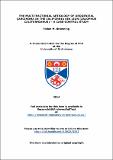The multi-factorial aetiology of urogenital carcinoma in the California sea lion (Zalophus californianus) : a case-control study
Abstract
California sea lions (CSLs) have an unusually high occurrence of urogenital cancer (UGC), with studies revealing metastatic carcinoma in 26 % of CSLs admitted to a rehabilitation centre between 1998 and 2012. It is likely that the aetiology of this disease is multi-factorial as genetics, viral infection and exposure to contaminants have been associated with this cancer to date. The goal of this study was to investigate the association of a number of factors using a case-control study design on animals admitted to a rehabilitation centre. The study additionally concentrates on two main areas; (i) genetic factors and (ii) the presence of herpesvirus.
Previous investigations identified cancer to be more likely in animals with specific microsatellite alleles. In the present study genotyping of CSLs at three microsatellite loci revealed that homozygosity at one marker (Pv11) was significantly associated with the presence of the disease. Pv11 was found to be located within a gene called heparanase 2 (HPSE2) and investigations into the expression of its protein revealed differences according to Pv11 genotype.
The presence of herpesvirus was investigated by two PCR methods and identified the gammaherpesvirus OtHV-1. The results of the two methods were contradictory with one method identifying a highly significant relationship between the presence of OtHV-1 and UGC whereas the other did not. Complicating factors such as potential differences in sensitivity of the tests along with the possible presence of closely related viruses or variants of OtHV-1 may explain this.
The availability of necropsy data for the CSLs in the study allowed the inclusion of body condition data in the statistical analysis to evaluate other potential risk factors. Final analysis revealed the presence of three risk factors; Pv11 genotype, OtHV-1 presence and thinner blubber.
This study is the largest study undertaken so far in order to investigate the involvement of risk factors associated with UGC in the CSL and supports a multi-factorial aetiology of this disease.
Type
Thesis, PhD Doctor of Philosophy
Collections
Items in the St Andrews Research Repository are protected by copyright, with all rights reserved, unless otherwise indicated.

